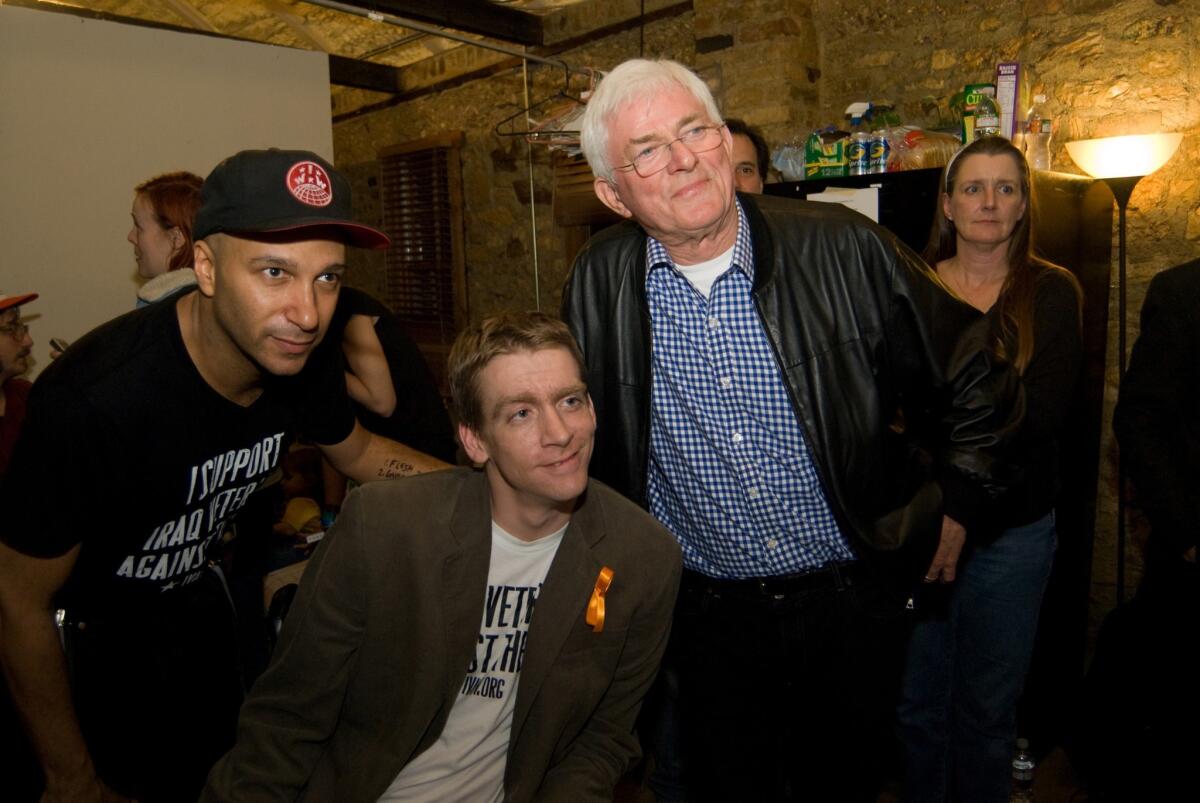From the Archives: Antiwar film project keeps Phil Donahue on the attack

Nearly four years ago, when Phil Donahue, the onetime king of daytime television, set to make a documentary film about the war in Iraq, he knew he’d be telling a story of shattered hearts. What he never guessed was that the project would break his own.
“Body of War” is the story of 26-year-old Tomas Young, a handsome young Kansan who enlisted in the Army not long after 9/11. He wanted to go to Afghanistan to hunt down Osama bin Laden but ended up in Iraq instead. An insurgent’s bullet penetrated his spine, and he became one of more than 13,000 American soldiers and Marines to return home badly wounded, many permanently disabled. Donahue met Young on a tour of Washington’s Walter Reed Army Medical Center, where the newly engaged vet was undergoing rehabilitation and learning to use the wheelchair he’ll need for the rest of his life.
“The first time I saw him will be with me forever -- paralyzed from the chest down,” the 72-year-old former TV star said. “He had that morphine look: droopy-eyed, sallow, sunken, lifeless. ‘Body of War’ is a film provoked by my own questions as I stood on my functional legs at his bedside. Why him and not me?”
Donahue resolved to tell the story of Young’s struggle to recover his life and enlisted director Ellen Spiro, a documentarian who has made films for HBO and PBS, in the effort. Along the way, their subject became involved in the growing antiwar movement, which reinforced the filmmakers’ decision to intersperse Young’s personal story with footage of the congressional votes and hearings that sent hundreds of thousands of young American men and women to war in Iraq. The film debuted on the festival circuit in Toronto last year to standing ovations and nearly universal critical acclaim.
Theatrical release, perhaps a cable deal -- the holy grail of documentary filmmakers -- seemed within reach. And then they weren’t.
“It’s been a big disappointment” said Donahue over lunch at the Peninsula Hotel in Beverly Hills this week. The film, which has been making the festival and small-theater rounds for more than a year, “goes up on marquees -- and then it goes down. I’ve been jumping out of cakes everywhere. I just came from Seattle, Berkeley and San Francisco. . . . This business will break your heart.”
An executive at HBO screened the film at Donahue’s request, then turned to him: The film was excellent, she said. But then she skeptically asked, “Will people pay $11 to see this?” Like most Hollywood suits, she’s watched one Iraq-related film after another tank. “I thought she was cold, but now it’s hard to argue with her point of view,” Donahue said. At one point, he said, he found himself standing on a chair in a bar in Washington, inviting patrons to see the film in a nearby theater. He jokes that he’ll take the film door-to-door himself. “I’ll park cars at the theater,” he said.
So what keeps this first-time war documentary producer going against the popular and economic odds?
According to Donahue, it’s the same thing that first interested him in the project -- Tomas Young. “He had his whole life ahead of him. He’s a hero, if I have ever met one.”
Then there’s the anger, which won’t surprise anybody who recalls a bit about Donahue’s politics. (After all, his talk show was on television from 1967 to 1997.) He himself muses over “how people still come up to me and say, ‘It was because of your show that I was able to tell my parents I am gay,’ or ‘I got out of my abusive marriage because of what you said on television.’ ”
That anger over the failed debates and miscast votes that sent Young and his comrades into harm’s way fueled a decision some critics have questioned -- to intercut CSPAN footage of congressional proceedings with Young’s personal story. The critics see aesthetic distraction; Donahue sees the cause of his subject’s anguish.
Anger and an affectionate sense of obligation to the heroic Young keep Donahue on the road, looking for an audience. So too does his collaborator Spiro, who dropped in on the tail end of the Beverly Hills luncheon this week. She’s a documentary vet herself and knows how rough the game can be. She sits down, orders coffee and digs into a plate of cookies. Donahue visibly brightens.
“Honestly, I would do this all over again,” he says.
She laughs. “That’s not what you told me,” she teases.
“Well,” he admits, “maybe not again with my own money.”
“Marlo,” Donahue’s wife, actress Marlo Thomas, “keeps wondering when I’m sending you home,” Spiro says. “I said, he’ll be in the Fed-Ex box, covered with icing from jumping out of all those cakes.”
The collaborators recall how some people even suggested that their downbeat title was a fundamental mistake. “Maybe we should have called it, ‘Happy, Happy Soldier Boy,’ ” Spiro says with a laugh. “My next movie,” Donahue adds, “will have Angelina Jolie in it -- even if she’s only reading the credits.”
More to Read
Sign up for Essential California
The most important California stories and recommendations in your inbox every morning.
You may occasionally receive promotional content from the Los Angeles Times.










